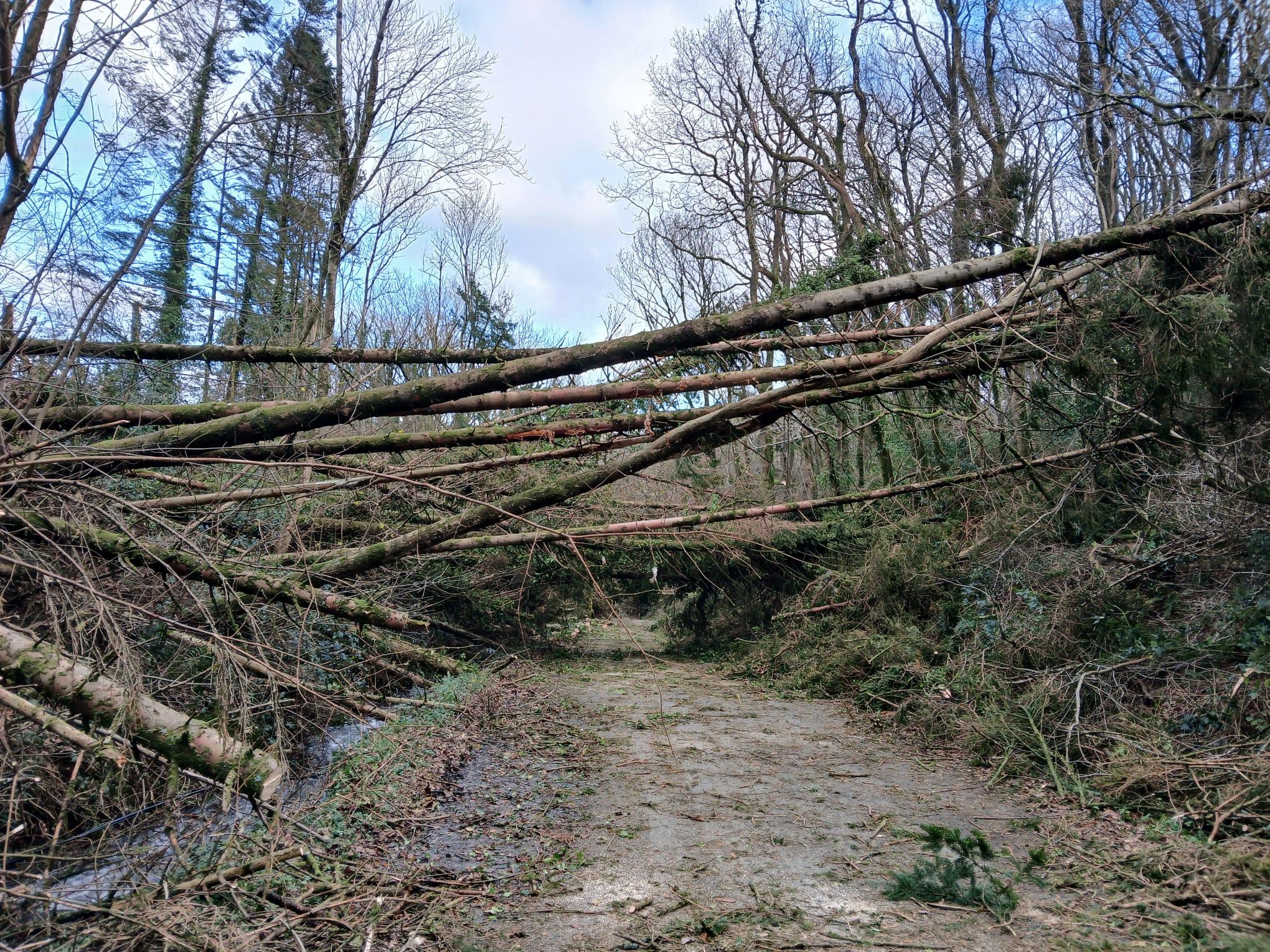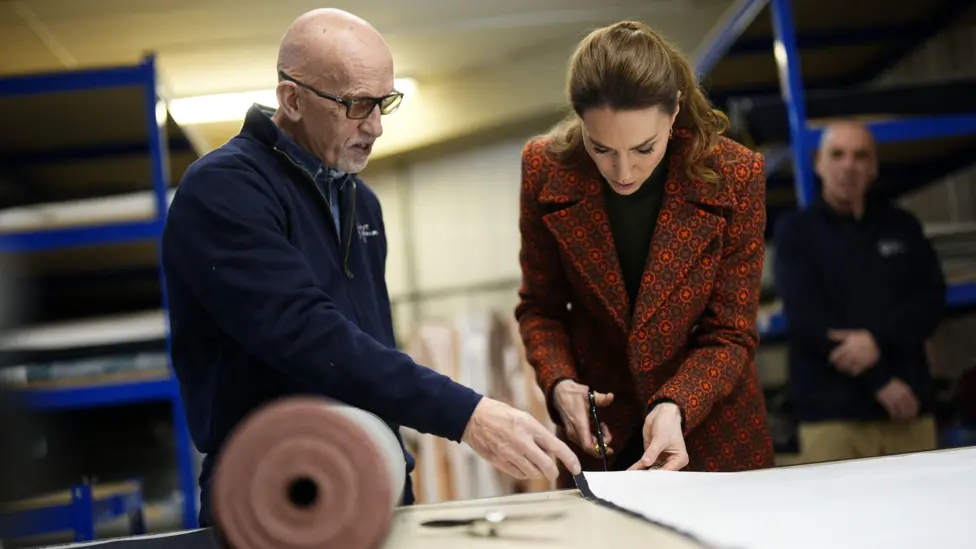Community
Pembrokeshire Trading Standards warn against cold callers after Storm Darragh

TRADING STANDARDS is asking the public to be aware of rogue traders and cold callers who may try to take advantage of the damage caused by Storm Darragh.
“Opportunistic rogue traders may exploit the situation left in Storm Darragh’s wake by persuading residents that their properties require urgent attention such as repairs to fences, replacement of loose roof tiles or the removal of damaged trees,” said Cllr Jacob Williams, Cabinet Member for Planning and Regulatory Services.
“They may apply pressure by claiming that work needs doing immediately to secure the property, charge excessive amounts and insist on up-front payments.
“Paperwork is often not provided or contains incorrect contact details. Often work carried out is of poor quality, and as work proceeds the traders can claim more work is required than is actually necessary.”
Trading Standards advises:
- Not to deal with cold callers offering to undertake work, no matter what claims they make.
- Contact your home insurance provider to see what you are covered for and the procedure for making any claim.
- Speak to family, friends or neighbours for recommendations of tradesmen.
- Obtain several written quotes.
- Be cautious of responding to leaflets dropped at your home, advertisements on social media, trader platforms and online reviews.
- Take time to decide. Reputable traders will not pressurise you to make a decision.
If you see anyone acting suspiciously, are concerned about any traders working or leafleting in your area or have been a victim of a rogue trader yourself you can report it to Trading Standards by contacting Citizens Advice helpline on 0808 223 1133 (or 0808 223 1144 for Welsh speakers), the police on 101 or dial 999 if you feel threatened or intimidated.
Community
Murals legacy honoured at Town Hall

Artist Jeanne Lewis recognised as Pembroke celebrates 20 years of historic artwork
MRS JEANNE LEWIS and her daughter were guests of honour at a special presentation at Pembroke Town Hall on Tuesday to mark the 20th anniversary of the historic murals installed inside the building.
Two handcrafted benches, gifted by Pembroke Town Council, were presented in appreciation of the artwork created by Jeanne and her late husband, George Lewis, whose striking panels have become a defining feature of the Hall over the past two decades.
The murals, which vividly depict scenes from Pembroke’s past, have long drawn praise from residents and visitors alike for their scale, colour and intricate storytelling.
The Mayor of Pembroke, Gareth Jones, joined councillors and volunteers from Pembroke Museum to present Mrs Lewis with a Certificate of Appreciation and a bouquet of flowers in recognition of the couple’s lasting artistic legacy.
Councillor Jones said the town was “extremely fortunate and deeply privileged” to house the collection.

He added: “People often walk into the Town Hall and simply stop to look. The detail and the history captured in these murals are remarkable. They give visitors a real sense of Pembroke’s story and reflect the dedication and talent Jeanne and George brought to the project.”
Twenty years on, the artwork continues to enrich the civic building, ensuring the Lewis family’s contribution remains at the heart of the town’s heritage.
Photo caption: Jeanne Lewis receives a certificate from Mayor Gareth Jones at Pembroke Town Hall, marking 20 years since the installation of the town’s historic murals (Pic: Martin Cavaney/Herald).
Community
Celebrating nature recovery through Cysylltu Natur 25×25

A CELEBRATION event was held on Saturday, January 24 in Cwm Gwaun to mark the achievements of Pembrokeshire Coast National Park Authority’s Cysylltu Natur 25×25 project, bringing together volunteers, farmers and staff involved in delivering nature restoration across North Pembrokeshire.
The landscape-scale project was funded by the Welsh Government through the Nature Networks Programme, delivered by the Heritage Fund. The Programme aims to strengthen ecological connectivity and resilience by restoring habitats at scale.
Those attending the event heard about the wide range of conservation activity delivered through the project across the north of the National Park. This has included practical works to restore grazing to Rhos pasture to benefit marsh fritillary butterflies and southern damselflies, specialist work to conserve rare lichens, volunteer chough, dormouse and harvest mouse monitoring, safeguarding greater horseshoe bat hibernation sites, and targeted action to tackle invasive species threatening important sites.
Volunteers, farmers, land managers and contractors played a vital role in the success of the project, contributing local knowledge, practical skills and ongoing commitment to caring for Pembrokeshire’s unique landscapes and wildlife in the long term.
Mary Chadwick, Conservation Officer for Pembrokeshire Coast National Park Authority, said: “Cysylltu Natur 25×25 has shown what can be achieved when farmers, volunteers and conservation specialists work together with a shared aim.
“From monitoring some of our most elusive species to restoring and protecting habitats, the dedication of everyone involved has made a real difference for nature across the National Park.”
Although the Cysylltu Natur 25×25 project is now coming to an end, the important work it has supported will continue. Building on its successes, Pembrokeshire Coast National Park Authority will carry this momentum forward through the next phase of nature recovery work under NNF4 Cysylltiadau Naturiol / Naturally Connected, ensuring ongoing protection and enhancement of habitats for future generations.
Community
Princess of Wales praised for ‘skill’ during local wool mill and factory visit

Royal tour shines spotlight on west Wales textile heritage and local jobs
CATHERINE, Princess of Wales was told “she’s got the skill” after trying her hand at traditional textile work during a visit to west Wales on Tuesday (Feb 3).
The royal spent the day meeting staff and apprentices at two well-known manufacturers – Melin Tregwynt in Pembrokeshire and Hiut Denim in Cardigan – highlighting the region’s long-standing reputation for craftsmanship and small-scale, high-quality production.
Stitching and mending at historic mill

At Melin Tregwynt, a family-run woollen mill that now operates as an employee-owned trust, the princess was guided through each stage of production, from weaving to finishing.
In the quality control room she was invited to mend a blanket using a needle and thread, carefully repairing the fabric under the watchful eye of experienced staff.
Paula Harding, who has worked at the mill for more than a decade, praised her technique, saying: “She did it right – and she didn’t go through the other side. That’s skill. She’s got the skill.”
Laughing, the princess told workers: “You make it look so easy,” adding that the craft was clearly “a labour of love”.
She asked questions about the history of the business, which has produced Welsh-designed blankets and throws for more than a century, and spoke with several generations of the same families who have worked at the mill.
‘Made in Wales’ denim

Later, the princess travelled to Hiut Denim, the Cardigan-based firm credited with bringing jeans manufacturing back to the town after large factories closed in the early 2000s.
The company now focuses on small-batch, premium denim and employs skilled cutters and machinists locally.
During a tour of the factory floor, the princess tried cutting out a pair of jeans and helped stitch a “Made in Wales” label onto a finished pair that staff said would be presented to the Prince of Wales.
“He will love those,” she replied.
She joked that there was “no pressure” when handed the cutting tools and said she enjoys making clothes herself, admitting the most adventurous project she had attempted was sewing a pair of pyjamas.
The royal also stopped to greet Barney, the factory’s English cocker spaniel, drawing smiles from staff.
Meeting well-wishers

Crowds gathered outside both sites to catch a glimpse of the visitor, with the princess spending time chatting with families and children before moving on.
The visit forms part of ongoing efforts by the royal household to showcase traditional industries and skilled manufacturing across the UK, with west Wales’ textile sector recognised as a key part of the region’s heritage and economy.
For workers at both businesses, the message was simple: the spotlight on locally made products and homegrown skills was just as important as the royal presence itself.

-

 Health7 days ago
Health7 days agoConsultation reveals lack of public trust in health board
-

 News2 days ago
News2 days agoPrincess of Wales visits historic Pembrokeshire woollen mill
-

 Crime6 days ago
Crime6 days agoPembroke man accused of child sex offences sent to Swansea Crown Court
-

 Health3 days ago
Health3 days agoDoctor struck off after sexual misconduct findings at Withybush Hospital
-

 Community7 days ago
Community7 days agoCampaign to ‘save’ River Cleddau hits over 2,200 signatures
-

 Community5 days ago
Community5 days ago50s women threaten legal action over pension compensation refusal
-

 Business7 days ago
Business7 days agoEight-year prison sentence after vehicle stop uncovers drugs worth over £150,000
-

 Crime1 day ago
Crime1 day agoHakin man’s appeal delayed again as Crown Court seeks guidance on insurance law


























